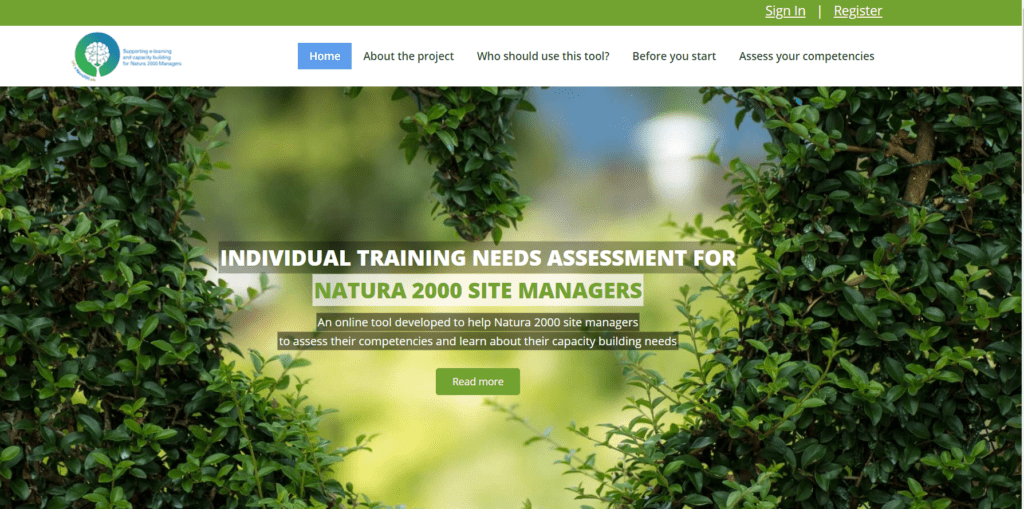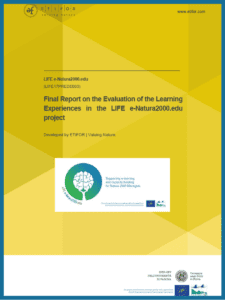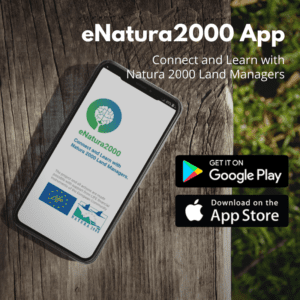LIFE e-Natura2000.edu: Final Report
The LIFE preparatory project LIFE e-Natura2000.edu explored the potential of building new approaches and learning methods to improve knowledge and capacity amongst people with responsibilities in Natura 2000 management in both public and private land, over a three-year period (2019-2021). ‘Final Report on the Evaluation of the Learning Experiences in the LIFE e-Natura2000.edu project’ provides the results of and summarises the main impacts of the project.
The LIFE.edu project analysed training needs and made available new tools to access information and learn about the skills required for Natura 2000 management and policy implementation.
In this Report you will be able to see many interesting insights connected to the main learning components delivered within this project and that include:
- Online Training Needs Assessment tool
- Online learning courses
- Virtual Summer School and
- LIFE e-Natura 2000 Smartphone App
- Communication tools
Online Training Needs Assessment tool
This online tool was developed within the project to help Natura 2000 site managers to assess their competencies and learn about their capacity building needs.
Online learning courses
Between March and June 2020 three online courses took place and consisted of different learning modules. Each course counted about 20-25 participants and foresaw an in-presence conclusive workshop. Unfortunately, the period coincided with the first peak of the COVID-19 outbreak in Europe. As a result, only one in-presence workshop was carried out instead of three.
The three competencies courses included:
- Competent inclusive communication, led by EUROPARC;
- Building alliances for Natura 2000 management, led by FUNGOBE;
- Applied conservation biology, led by ProPark
The post project evaluation shows that 84% of participants would recommend the learning experience to colleagues or other people working with or involved in Natura 2000 management and 58% of respondents are willing to pay between 50 and 200€ for such a course in the future.
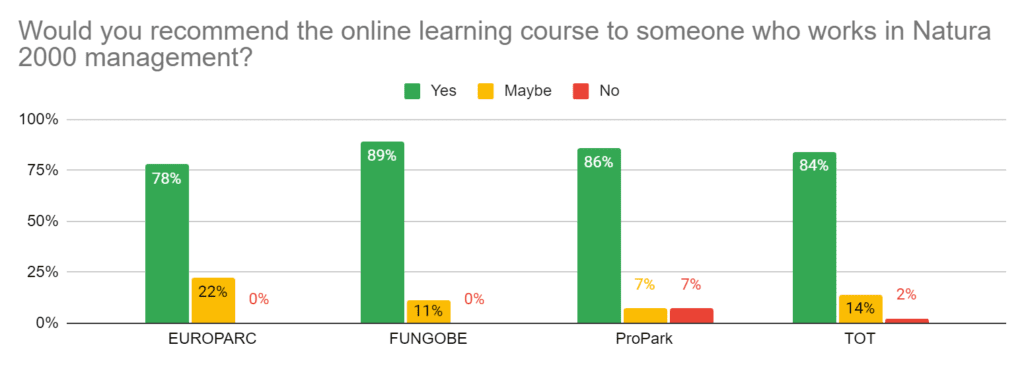
Recommendation level of the learning courses. The whole group of core project participants is identified by the label “TOT” (“total”)
Virtual Summer School
Planned as an in-presence Spring School (later as a Summer School) and scheduled for April (and then September) 2020, it was the learning component most impacted by the pandemic. It was re-scheduled for June 2021 and, therefore, turned into a Virtual Summer School.
Participants were very satisfied with the Virtual Summer School as well. Additionally, the organisation, provided by the project partners and TESAF as the lead partner for the activity, was rated very positively.
Most satisfaction was expressed regarding the following objectives:
- Improving stakeholders-engaging techniques and participation strategies;
- Improving knowledge about monitoring habitat types and species;
- Improving communication skills and knowledge about communication approaches.
Apart from that participants highlighted good organisation, qualified speakers, balanced programme, good variety of topics, interesting examples of Natura 2000 sites, and networking and interaction.
Recommendations
Another indicator of the effectiveness of the learning experience is the willingness to share and encourage colleagues and people working in the same sector to participate. 87% of the respondents said they were willing to recommend their course to others.
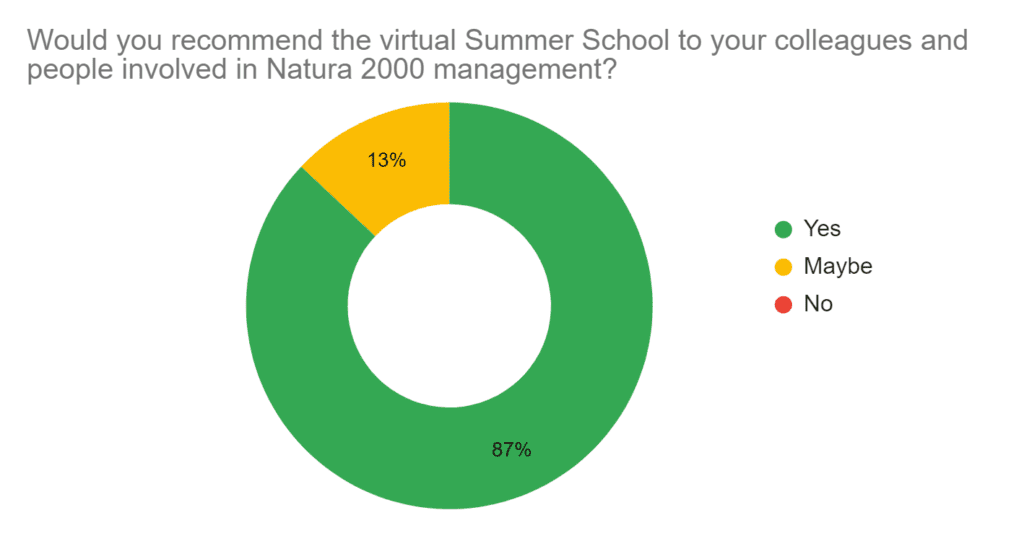
Participants’ intention to recommend the Virtual Summer School to people involved in Natura 2000 management
Participants expectations from the project
Based on participant’s feedback most expectations from the project were related to:
- Networking with other Natura 2000 managers (high expectations for 75% of respondents);
- Improving knowledge about Natura 2000 management practices (high expectations for 80%);
- Improving technical knowledge with online tools (high expectations for 67%).
Satisfaction levels
Satisfaction levels of participants were assessed against initial expectations, as well as against aspects or topics deepened by all learning courses, such as communication skills, stakeholder engagement techniques and participatory strategies. Overall, satisfaction is high for all components: this very positive feedback highlights the effectiveness and impact of the project itself. Slightly moderate satisfaction is shown in the increase of job opportunities, but considering it is the most powerful indicator to assess socio-economic impacts of the project, it is already a great achievement that 40% of respondents have at least a high level of satisfaction regarding this point.
Acquired competencies
Some of the competencies acquired by the core project participants include:
- E-learning skills; communication strategy; awareness and education;
- Stakeholder analysis and understanding; active listening; stakeholder engagement;
- Presentation skills; teamworking; audience understanding and targeting;
- Conflict management and solving; effective joint-working and collaboration; feedback giving and receiving;
- Negotiation skills; communication with social media; participatory techniques;
- Problem solving; decision making;
- Planning and organisation; scientific thinking;
- Conservation status assessment; operational planning
At the end of each module, the attendees were asked about their intention to apply the online learning tools to their work context. More than 75% of participants were willing to apply the tools during the courses.
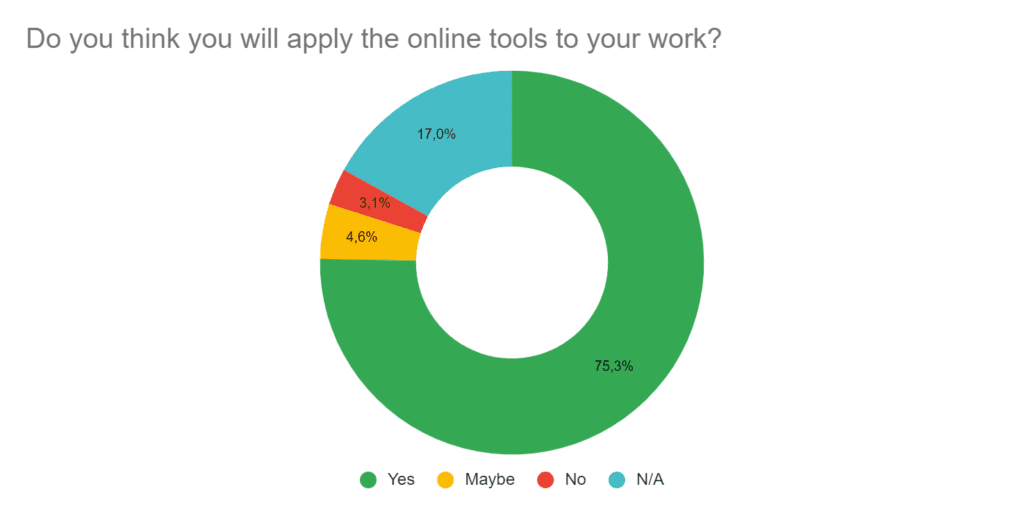
Participants’ intention to apply online tools to their work

Photo by Shane Rounce on Unsplash
What is described in the chart above in terms of intentions, was confirmed by the post project 6-month evaluation survey, where former participants were asked how they were applying the online learning. Overall, 96% of respondents started applying (or would soon) what they learned in their daily work. About half of respondents who benefit from learning in their daily work state that the learning experience was an inspiration for new activities.
New activities and impacts which are a result of the project include:
- New job opportunities
- New projects
- New collaborations
- New funding programs to apply
- New practices and activities useful for future funding applications
- Research and field studies
- New engagement techniques
- New communication strategies
- Production of communication materials
- New areas of work
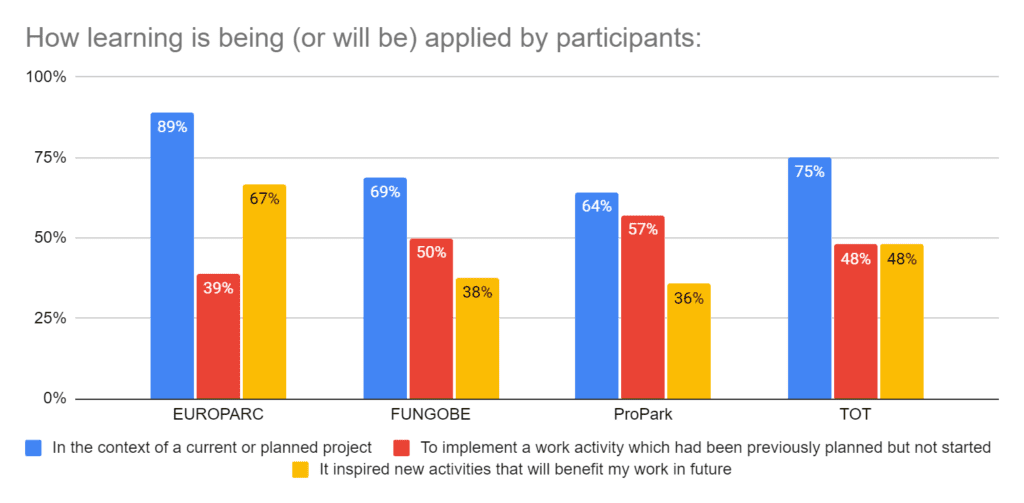
Participants’ application of learning *The whole group of core project participants is identified by the label “TOT” (“total”)
The LIFE e-Natura 2000 Smartphone App
The LIFE e-Natura2000 App is one of the most powerful learning and networking tools delivered by the LIFE e-Natura2000.edu project. It has been designed to enable Natura 2000 site managers and private landowners to connect, discuss and learn in an innovative way and to provide a continuous flow of relevant news, features and videos about the Natura 2000 network.
All of the users found the app very useful or useful, and some of the most frequently stated reasons they use it for are:
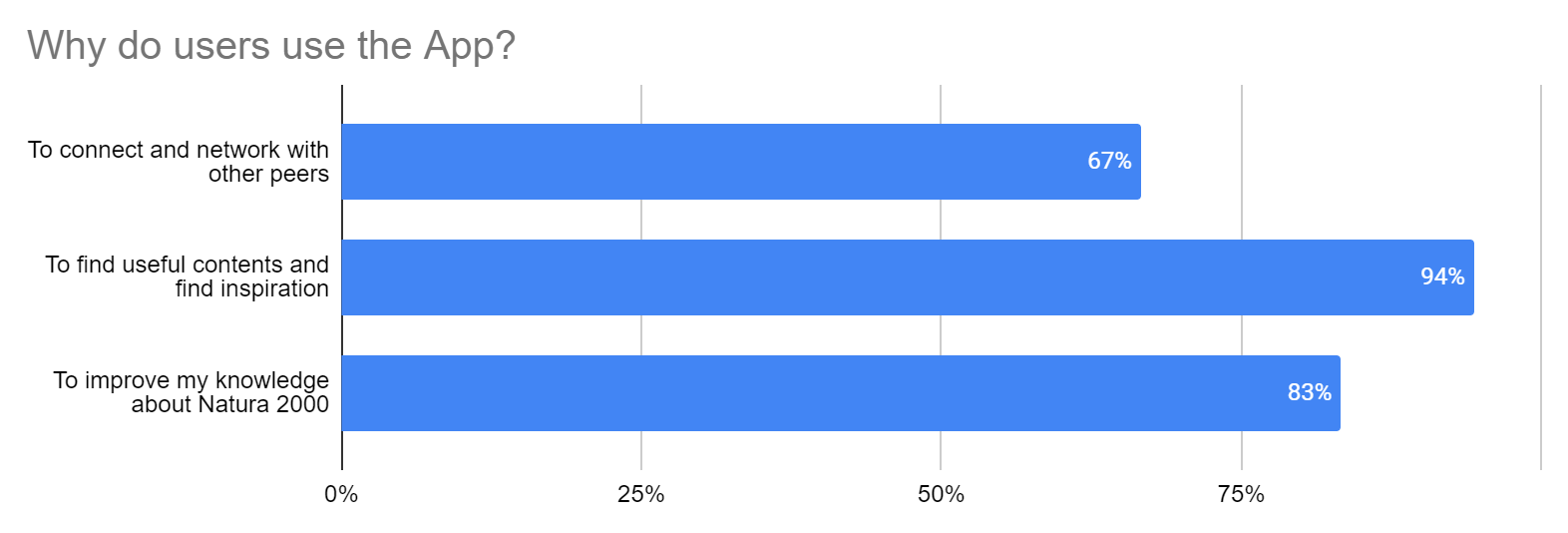
Reasons why users use the App
Challenges posed by the pandemic
Even though this project was significantly impacted by the pandemic, COVID-19 also showed how risks are often accompanied by opportunities: the courses were designed to be delivered primarily online before the pandemic started and this core aspect helped to overcome most difficulties.
The pandemic allowed people to see the benefits of accessing new structured content online.
Some of these benefits include:
- Online tools can be recorded and are available over a longer period of time
- Online tools allow for greater participation, also by participants who may not be able to take time off for travel;
- They decrease time spent away from home/work and costs and environmental impacts associated with travel;
- They can be very useful as we near a future in which more attention needs to be paid to the impacts of travel on the climate.
Conclusions & recommendations
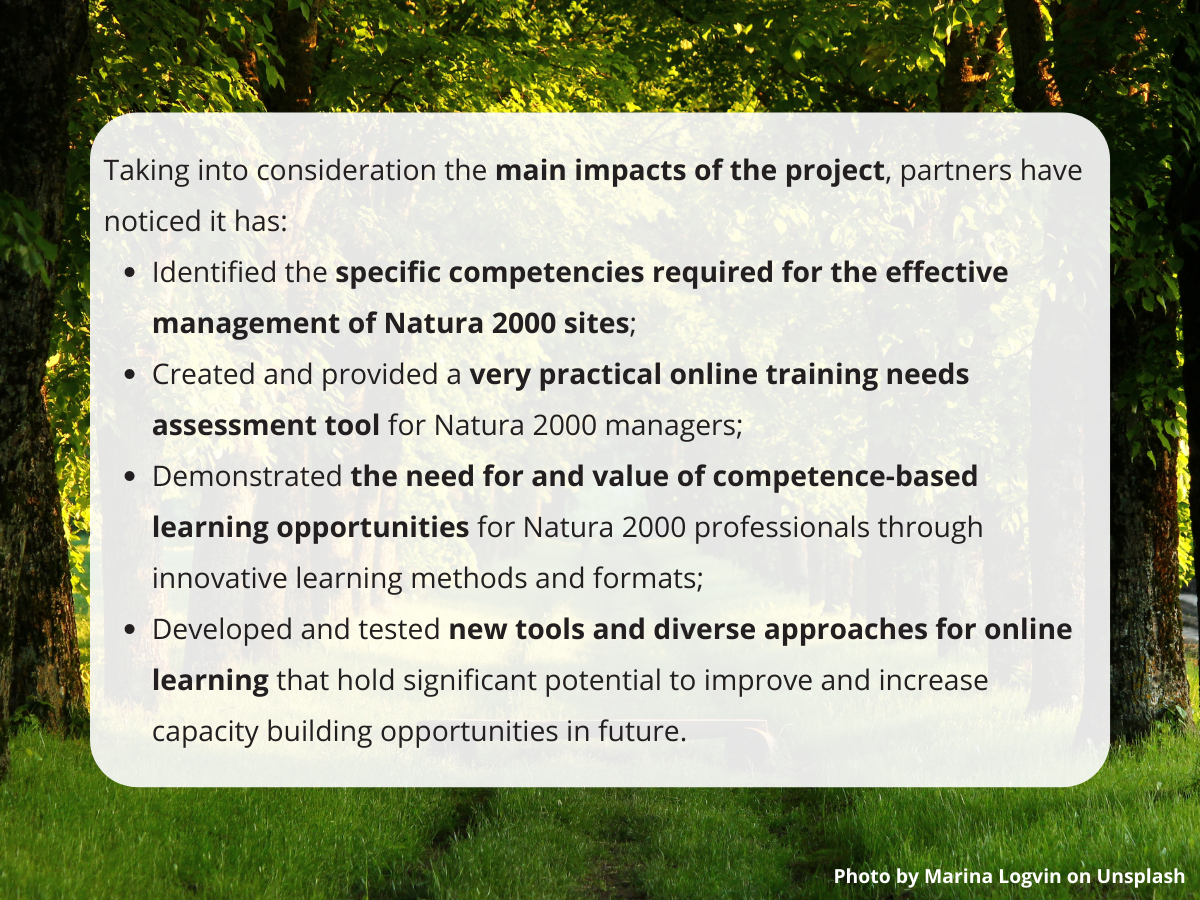
The main impacts of the LIFE.edu project
Other important impacts cited by the partners are that the project LIFE.edu has:
- Created momentum for and demonstrated the value of a larger scale follow-up project;
- Strengthened the links between academic and professional Natura 2000 managers;
- Extended partners’ networks (amongst LIFE e-Natura2000.edu partners and with project participants);
- Increased knowledge about Natura 2000 and its management challenges among all stakeholders (partners, participants, managers, landowners and project sponsors).
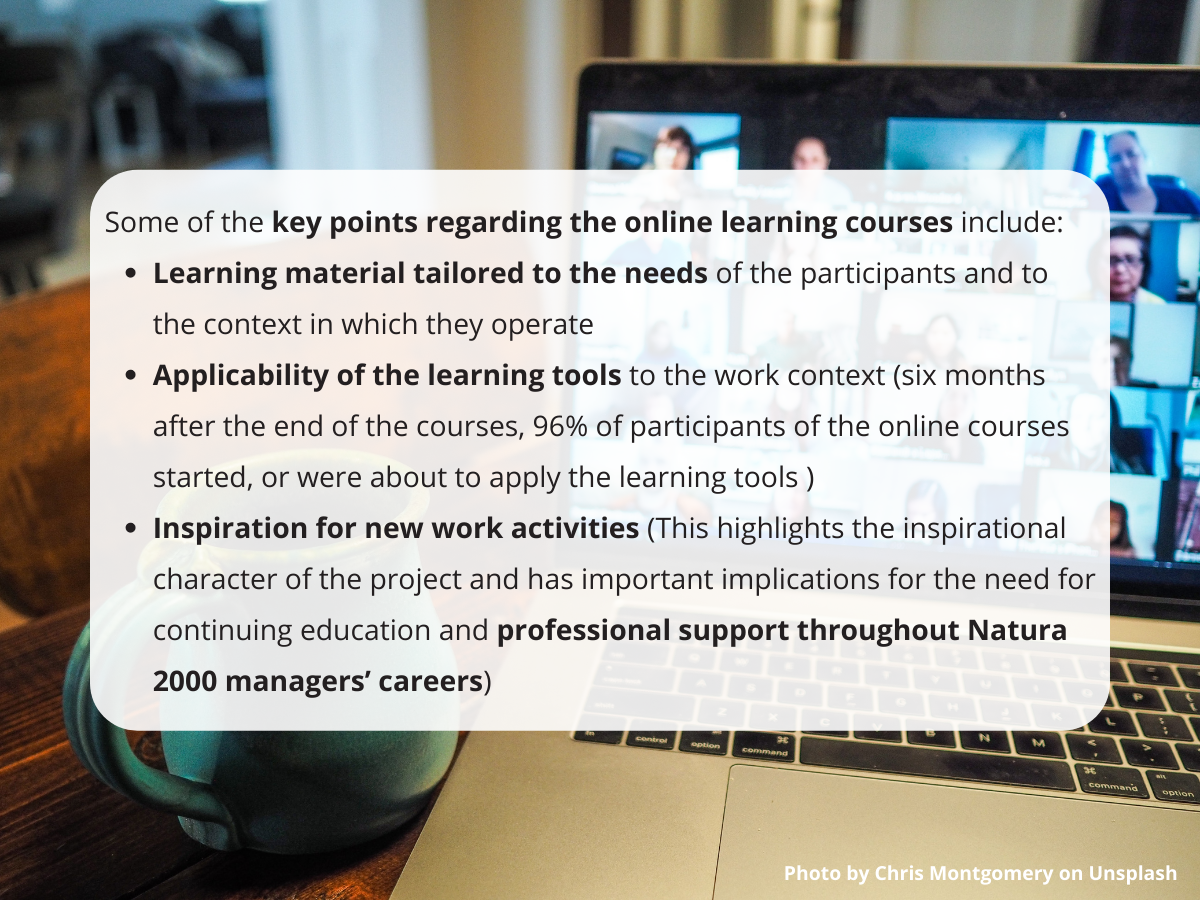
Life.edu key points regarding the online learning courses
If you would like to take a look at the detailed project report, you can download the full document here:
